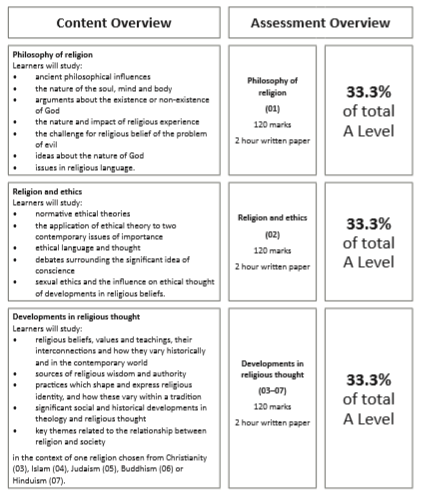Why study A Level Religious Studies?
In recent years, interest in studying philosophy at A Level has increased dramatically.
But why are people interested in philosophy? What use is the study of philosophy? The answers may include some of the following:
1. Subject matter: The questions that philosophy investigates are some of the most profound that we can ask. What can we know about the world we live in, and is certainty important? Is right and wrong ‘simply’ a matter of culture? Is it rational to believe in God? Are we just animals which have evolved, or do we have a spiritual dimension which will survive the death of our bodies?
2. Independent thought: Doing philosophy is an excellent training in thinking for yourself. Many people are quick to say that what people believe, especially on such philosophical matters as ethics or religion, depends on their upbringing. But very few people say this about themselves. Does what you think about abortion, or miracles, come straight from your parents and teachers? Or do you think you have good reasons to believe what you do? If you aren’t thinking for yourself already, doing philosophy will provide you with the perfect opportunity.
3. Character: Because it encourages open-mindedness, doing philosophy can actually change your character. It can help you mature in your thoughts about and relations with people who are different from you.
4. Reasoning: Doing philosophy is not easy. It is difficult to understand the arguments and the ideas. As with doing anything that is difficult, you develop new skills which make it easier with practice. Some of the skills that doing philosophy can teach you are:
But why are people interested in philosophy? What use is the study of philosophy? The answers may include some of the following:
1. Subject matter: The questions that philosophy investigates are some of the most profound that we can ask. What can we know about the world we live in, and is certainty important? Is right and wrong ‘simply’ a matter of culture? Is it rational to believe in God? Are we just animals which have evolved, or do we have a spiritual dimension which will survive the death of our bodies?
2. Independent thought: Doing philosophy is an excellent training in thinking for yourself. Many people are quick to say that what people believe, especially on such philosophical matters as ethics or religion, depends on their upbringing. But very few people say this about themselves. Does what you think about abortion, or miracles, come straight from your parents and teachers? Or do you think you have good reasons to believe what you do? If you aren’t thinking for yourself already, doing philosophy will provide you with the perfect opportunity.
3. Character: Because it encourages open-mindedness, doing philosophy can actually change your character. It can help you mature in your thoughts about and relations with people who are different from you.
4. Reasoning: Doing philosophy is not easy. It is difficult to understand the arguments and the ideas. As with doing anything that is difficult, you develop new skills which make it easier with practice. Some of the skills that doing philosophy can teach you are:
- understanding the relations between ideas: how one idea can imply another or contradict it
- the ability to spot flaws in arguments
- the ability to construct arguments
- imagination: coming up with novel solutions and ideas
- communication and conversation: philosophy is done through discussion and debate.
What do we study in Alevel Religious studies?
|
We currently follow the OCR exam board for A level Religious Studies. You will study three components as part of your A level:
We also use a number of books to develop and assist our studies, the main books we will use are: |

